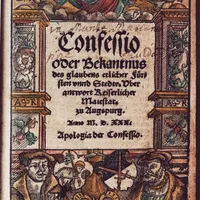Art. I.—De Deo.
Article|||
Kunst. I. – Von Gott
Art. I.—Of God.
Arte. I.—De Dios.
Art. I.—De Dieu.
Arte. I.-Di Dio
美術。 I.—神のもの。
Arte. Eu.—De Deus
Ecclesiæ magno consensus apud nos docent, Decretum Nicænæ Synodi, de unitate essentiæ divinæ et de tribus personis, verum et sine ulla dubitatione credendum esse.
"of the Church"|great|agreement|"among us"|among us|"teach"|Nicene Creed|Nicene|of the council||"of unity"|of the essence|divine essence|||three|three persons|true and certain||without any|any|without doubt|to be believed|"to be believed"
The great consensus of the Church among us teaches that the Decree of the Council of Nicaea, concerning the unity of the divine essence and the three persons, must be truly believed without any doubt.
Церкви учат с великим согласием между нами, что Постановление Никейского Синода о единстве Божественной сущности и трех Лиц истинно и ему следует верить без всякого сомнения.
Videlicet, quod sit una essentia divina, quæ et appellatur et est Deus, æternus, incorporeus impartibilis, immensa potentia, sapientia, bonitate, creator et conservator omnium rerum, visibilium et invisibilium; et tamen tres sint personæ, ejusdem essentiæ et potentiæ, et coæternæ, Pater, Filius et Spiritus Sanctus.
"Namely" or "That is"|"that"|"may be"||divine essence||||is called||||"Eternal"|"Without a body"|indivisible|"immense" or "boundless"|power|wisdom|goodness|creator||preserver of all|||visible things||invisible|||||persons|of the same|||"of power"||co-eternal|||||
Namely, that there is one divine essence, which is called and is God, eternal, incorporeal, indivisible, of immense power, wisdom, goodness, creator and preserver of all things, visible and invisible; and yet there are three persons, of the same essence and power, and coeternal, the Father, the Son and the Holy Spirit.
Очевидно, что есть одна божественная сущность, которая и называется, и есть Бог, вечный, бестелесный, несообщаемый, огромной силы, премудрости, благости, творец и хранитель всех вещей, видимых и невидимых; и все же есть три личности, имеющие одну и ту же сущность и силу и одновременно вечные: Отец, Сын и Святой Дух.
Et nominee personæ utuntur ea significatione, qua usi sunt in hac causa Scriptores Ecclesiastici, ut significet non partem aut qualitatem in alio, sed quod proprie subsistit.
|person||"use" or "employ"||meaning|||||||Church Writers|"Church Writers"||"may signify"||||quality or attribute||in another|||properly|"exists independently"
And the personal nouns use that meaning which the Ecclesiastical writers used in this case, so that it signifies not a part or a quality in another, but that which properly subsists.
И личные существительные употребляют то значение, которое употребляли в данном случае церковные писатели, так что оно означает не часть или качество в другом, но то, что собственно существует.
Damnant omnes hæreses, contra hunc articulum exortas, ut Manichæos, qui duo principia ponebant, Bonum et Malum, item Valentinianos, Arianos, Eunomianos, Mahometistas et omnes horum similes.
"They condemn"||heresies|||this article|"arisen against"||Manichaeans|||principles|they posited|||||the Valentinians|Arians|Eunomians|Muslims or followers of Muhammad|||of these|
They condemn all heresies that have arisen against this article, such as the Manichaeans, who posited two principles, Good and Evil, as well as Valentinians, Arians, Eunomians, Mohammedans, and all similar ones.
Они осуждают все ереси, возникшие против этого артикля, как, например, манихеев, ставивших два начала, Добро и Зло, а также валентиниан, ариан, евномиан, магометистов и всех им подобных.
Damnant et Samosatenos, veteres et neotericos, qui, cum tantum unam personam esse contendant de Verbo et de Spiritu Sancto astute et impie rhetoricantur, quod non sint personæ distinctæ, sed quod Verbum significet verbum vocale, et Spiritus motum in rebus creatum.
"They condemn"||Samosatans|||"modern ones"|||only||"person"||"they assert"|||||||cunningly||impiously|"they argue deceitfully"|||||distinct persons||||||spoken word||Spirit|"motion in things"|||"created being"
They condemn also the Samosatenes, both the ancient and the modern, who cleverly and impiously argue that there is only one person concerning the Word and the Holy Spirit, stating that there are not distinct persons, but that Word signifies a vocal word and Spirit a movement created in things.
Они также осуждают самосатов, древних и неотерических, которые, когда утверждают, что есть только одна Личность Слова и Святого Духа, используют хитрую и нечестивую риторику, что они не являются отдельными личностями, но что Слово означает гласное слово. , а Дух — движение, творимое в вещах.

